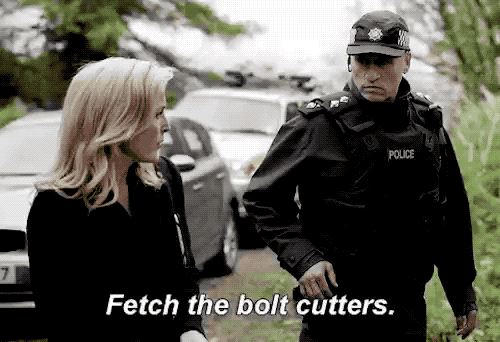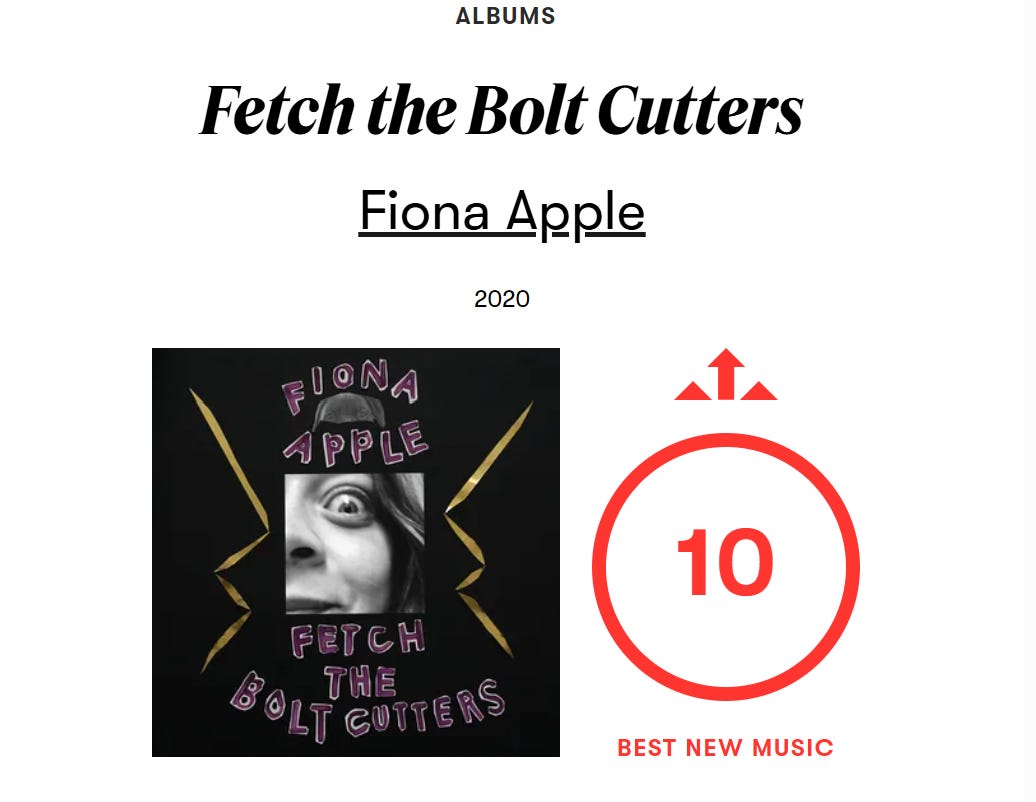'Fetch the Bolt Cutters' turns 5
Personal reflections on the liberating aesthetic of Fiona Apple's masterful 2020 record
I lived in Seattle for just over a year before the pandemic hit. When I moved, I left my car behind in Michigan. I would see if I needed one once I got here.
I didn’t and still don’t; what’s more, I don’t think I could afford one even if I did. It’s fine. The city has a decent public transit system, and I’ve gotten used to running up hills. After my first year here, I felt settled; I knew my way around, I’d made some friends, I had a favorite movie theater.
You know where this is going. What struck me immediately about the early days of those March lockdowns was the restlessness. I had been walking everywhere, every day; to work, the store, a neighborhood dive bar, a film series at Cinerama. And now I had nowhere to go. I enjoy rest and relaxation as much as the next person, but an entire year? Not for me.
These reserves of unused energy were unbearable. So I started stepping out; I did cautious loops around the neighborhood, making sure to go out onto the road to avoid other people.
I felt insane.
These short walks weren’t enough. I would arrive back home mildly satiated, but still on edge. I had to venture out for longer, do bigger laps, and wear myself out a bit. I only moved to move.
Into this emotional, spiritual, and physical vacuum entered my favorite musical artist.
Eight years after the release of her last record, Fiona Apple was coming out with new music. The initial reports around Fetch the Bolt Cutters indicated it would be dropping in October 2020. As the pandemic raged on, it became clear that touring around the album would not happen. And so, with a nudge from the recording artist King Princess, Apple threw us all a pandemic bone.
Fetch the Bolt Cutters, her fifth studio album, was released a full 6 months ahead of schedule, on April 17, 2020.1 The album cover features a zoomed-in black-and-white selfie of Apple, some lightning bolts, and a dog. It looks like it was cobbled together on Photoshop in less than 30 minutes. The title is pulled from the Gillian Anderson-led British crime series The Fall; when Apple heard the actress utter the line, she leaped off her couch and immediately knew she had to use it.
These nuggets, along with a short cellphone video of a dog running around on a beach scored to music from the album, were the biggest nuggets of information we had to go on before the album dropped.
Still, the release of a new Fiona Apple album is an event, a communal experience for melancholy, introspective aesthetes the world over. I had no idea what to expect from Fetch the Bolt Cutters, though.
Her fourth album, 2012’s The Idler Wheel Is Wiser Than the Driver of the Screw and Whipping Cords Will Serve You More Than Ropes Will Ever Do2, was the most stripped-down distellation of her style yet. The lush production of her previous albums was all but gone; here, the arrangements were sparse and percussion-heavy. Her voice- literal and artistic- was clearer than ever.
The Idler Wheel’s final track, “Hot Knife,” points toward Apple’s continued artistic evolution in Fetch the Bolt Cutters. The track is an overwhelming sonic barrage; its choruses overlap relentlessly as a timpani keeps a steady beat. It feels like Apple is not only breaking through artistically, but breaking out. Fetching the bolt cutters, if you will.
In the ensuing decade, Apple would crystallize this feeling further. Fetch the Bolt Cutters constantly feels on the edge of falling apart completely; it was recorded almost entirely in Apple’s home, with its walls and canine inhabitants featured as instruments. When she belts, “Blast the music; bang it, bite it, bruise it,” on album opener “I Want You To Love Me,” well, she’s not fucking around.
These 13 songs are acts of reclamation. Apple’s songwriting has always been nakedly confessional, but here she sings about things that feel entirely new. A dominant theme of the album is her relationship to her own womanhood and the women she has met throughout her life.
These observations are both pointed and off-kilter; she devotes an entire song to a grade school classmate named Shameika who told her she “had potential,” before she even knew what the word meant. At the center of the album is a one-two punch of “Newspaper” and “Ladies,” dissections of her spectral connection to women who have dated her exes.
The former track is cutting and furious; she sees a would-be confidant whom she still feels close to because of the shared experience of an unpleasant man:
I too, used to want him to be proud of me
And then I just wanted him to make amends
I wonder what lies he's telling you about me
To make sure that we'll never be friends
Where that track finds Apple’s voice bellowing and shaking, “Ladies” shows her in a much more playful and lilting register, though it is still another situation of exes trying to make sure these women won’t be friends. Apple still tries to break bread, and make community:
There's a dress in the closet
Don't get rid of it, you'd look good in it
I didn't fit in it, it was never mine
It belonged to the ex-wife of another ex of mineShe left it behind, with a note
One line, it said:
"I don't know if I'm coming across, but I'm really trying"
The track is carried by the repetition of both its title and the phrase, “Yet another woman to whom I won’t get through.” Each time she sings it, it feels like a battering ram, slowly disproving itself.
Fetch the Bolt Cutters is marked by such defiance. Many tracks march toward foregone conclusions only to end unexpectedly. The unstoppable piano melody that propels “I Want You To Love Me,” eventually breaks down, taken over by unexpected and sporadic wailing. There is an equal and opposite reaction on the end of “Relay;” it’s one of the album’s most frenetically percussive tracks, until it dissolves into this confessional whimper: “I used to go to the Ferris wheel every morning, just to throw my anger out the door.”
These moments of improvisational fervor give the album the feel of being born (or reborn) as we listen to it. This is essential to its power. Apple’s first three records, as strong as they are, were not fully hers. She has been able to exert more control over the finished product with each album; she has also grown more comfortable defying convention. This is inseparable from her artistry; she finds something better than strength in her own vulnerability: she finds truth.
I’m thinking now of “Heavy Balloon,” a song about depression. In it, Apple finds herself dragged down to the depths of despair, where “the bottom begins to feel like the only safe place that you know.”
But she is tired of holding this in, of “bursting at the seams.” So, she does what anyone would do. She “spreads like strawberries,” she “climbs like peas and beans!”
The relentless progression of this song matches the frenzy of the title track; both are about breaking (or growing) out of confinement. They’re about going through hell, making it out alive, and no longer letting people steal her fun.
The same can be said of “Drumset,” perhaps the biggest earworm on the entire record. In a wink to the homegrown percussion that drives both Idler Wheel and this one, she has a song about a man taking her drumset, leaving only an empty rug screaming at her. The song eventually becomes a way to excoriate him for not trying before walking out:
Now I understand, you're a human
And you got to lie, you're a man
And you got to get what you want
How you want it, 'cause so do I
And I wanted to try
Even amid the song’s endlessly catchy frustration, a palpable self-honesty shines through. She did want to try, but he took it all away.
In conversations I’ve had with people about this record, some still don’t know what to make of it. Others have said they find it abrasive; they don’t think it’s bad, it’s just not as easy to listen to as her previous work. Through gritted teeth, I remind them that Apple only wrote “Criminal” because her label said that her debut record, Tidal, needed a radio hit.
You’ll be shocked to find out I wholeheartedly disagree that this is a difficult record. That being said, I’d be lying if I didn’t mention that as I listened to Fetch the Bolt Cutters for the first time, I really didn’t know what to think. I was shell-shocked. It felt both unfinished and whole, experimental yet distinctly within Apple’s wheelhouse.
“It’s okay not to know what to think about something immediately,” I reminded myself. Still, I listened to it again straight away.
“Okay, this is really good,” I thought. Whew.
This feeling is similar to one that I had in high school when I first discovered M.I.A. I had never heard anything like Kala before. After giving it another chance (and another, and another), I eventually became obsessed with it. I listened to it everywhere- on my iPod, or driving around in my first car3.
I don’t often become fixated on music in this way. The only artist who can consistently spark this for me is Fiona Apple. Many of my friends associate me with her to such an extent that a couple of them even texted me congratulatory messages when Fetch the Bolt Cutters became Pitchfork’s first Perfect 10 record since Kanye West’s My Beautiful Dark Twisted Fantasy a decade earlier.
This has always been very amusing to me, because I think many of my friends are under the impression that I’ve been a die-hard Fiona Fan/Apple Acolyte since she started making music. That simply isn’t true. I became obsessed with her music in college when The Idler Wheel was released. Immediately, I felt a kinship with her. Her voice was powerful yet vulnerable; the music was built around it.
I spent that summer familiarizing myself with her other records, and each one has a special place in my heart. But because I was studying abroad that summer, I missed my chance to see her tour with The Idler Wheel.
“I can’t wait for her to tour with her next album!” I thought in the ensuing years. You’ll never guess what happened next!
For the rest of 2020, Fetch the Bolt Cutters was the soundtrack of my daily quarantine walk. I can confidently say that I have never listened to a record as much as this one. I would know this even without Apple Music measuring it.4
Now that it’s been around for five years, we can realistically expect that Fiona Apple might release new music in another few years. It’ll take another global pandemic to stop me from going to that show.
Technically, for those of us in Pacific Time, it dropped at 9 p.m. on April 16, 2020. I know this because I listened to it for the first time at 9 p.m. on April 16, 2020.
You know I had to write out the full title.
A black 2001 Ford Taurus, if you were wondering.
Every single track on the album is in my “Top 25 Most Listened” songs list, one right after another. I know, I know.







My memory is a bit fuzzy, but the first album (CD, really) I ever bought was either the Chemical Brothers' "Dig Your Own Hole" or Fiona Apple's "Tidal". I was a much cooler kid than I am an adult.
Fromtheyardtothearthouse.substack.com
and a happy fetch the bolt cutters to all